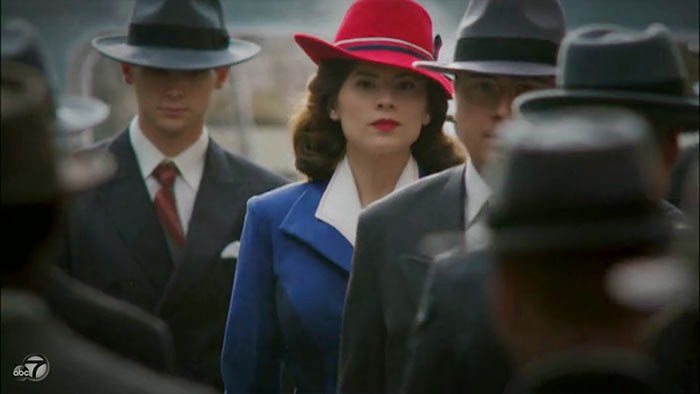TV-PG, 8 43-min. episodes
Creators: Christopher
Markus, Stephen McFeely
Directors: Stephen Cragg,
Louis D’Esposito, Peter Leto, Christopher Misiano, Vincent Misiano, Joe Russo,
Stephen Williams, Scott Winant
Writers: Stan Lee
(characters), Jack Kirby (characters), Christopher Markus, Stephen McFeely,
Eric Pearson, Lindsey Allen, Andi Bushell, Tara Butters, Chris Dingess, Brant
Englestein, Michele Fazekas, Jose Molina
Starring: Hayley Atwell,
James D’Arcy, Chad Michael Murray, Enver Gjokaj, Shea Whigham, Lyndsy Fonseca,
Bridget Regan, Ralph Brown, Meagan Fay
Guest starring: Dominic
Cooper, Kyle Bornheimer, Lesley Boone, Alexander Carroll, James Frain, James
Landry Hébert, Devin Ratray, James Urbaniak, Kevin Cotteleer, Patrick Robert
Smith, Neal McDonough, Leonard Roberts, GlennTaranto, Jack Conley, Rick Peters,
John Prosky, Pawel Szajda, Ray Wise, Ashley Hinshaw, Toby Jones, John Glover,
Andre Royo, Richard Short
So I read an interview with
Richard Dreyfuss the other day in which he questioned the interviewer’s use of
the term “the new golden age of television”, referring to the current
renaissance happening on television today. (Read the Indiewire article here.)
Dreyfuss claimed that the only Golden Age of television was in the early 50s
when it was the new form of entertainment in everyone’s household. While I agree
that perhaps a new term other than “Golden Age” might be in order to describe
an era 70 years down the line, I’m not so sure Dreyfuss quite understands what
the interviewer was talking about, because he went on to describe the current
television market of consisting only of police procedurals, courtroom dramas
and family sitcoms. I suddenly realized that Dreyfuss’ television provider only
carries CBS, ion and Nick at Nite.
I suppose it’s rather ironic
that one of the good examples of how diverse television has become is the
throwback television series inspired by Marvel comic books, “Agent Carter”. The
series is a breath of fresh air in its insistence to adhere to the heritage of
the style of entertainment that inspired it. It’s gumshoe. It’s adventure. It’s
intrigue. It doesn’t sacrifice story for action, and it dips just enough into
the comic book world of the Marvel universe to provide comic book nerds with
enough Easter eggs to satisfy.
“Agent Carter” isn’t content
to just be some comic book spin-off, however. It is very much it’s own entity
with it’s own style and atmosphere. At it’s center is Peggy Carter herself
bringing a feminist charge to a male dominated genre with a gender empowering
story where the men are in the dark and one powerful man is helpless to the
forces against him with Carter as his only hope to clear his name. Howard Stark
is suspected of arms dealing and goes into hiding, entrusting Agent Carter to
clear his name from inside the Strategic Scientific Reserve, a secret
government agency predating S.H.I.E.L.D. Carter’s own worth has been
significantly deflated since her involvement with the Captain America project
during WWII. Now that the war is over, most women have gone back to being
considered second-class citizens to their male counterparts. This actually
affords Carter a bit more maneuverability from within the SSR, as few of the
male agents give her any credit as a serious agent. She can get away with more
by being invisible as a woman in a man’s world.
Like it’s leading lady, the
show is more brains than brawn, building an intricate mystery dealing with the
Cold War that would rise out of the ashes of WWII. Some might find its reliance
on dialogue and characters as opposed to action the antithesis of its comic
book movie origins, but its nice to watch a show that actually considers its
characters and plot. That’s not to say there is no action. Peggy Carter is a
formidable hero and not your typical supermodel waif. When she’s kicking some
guy’s butt, you believe that she can.






No comments:
Post a Comment